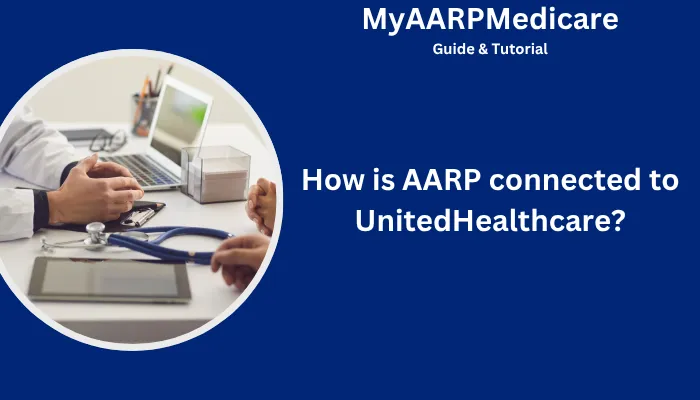As I explored options for Medicare plans, I stumbled upon the strong link between AARP and UnitedHealthcare, sparking my curiosity about their relationship. Many seniors, like me, rely on MyAARPMedicare for guidance, and understanding how AARP connects to UnitedHealthcare is key to making informed healthcare decisions.
This question—How is AARP connected to UnitedHealthcare?—is one I’ve asked myself, and I’m excited to share what I’ve learned. In this guide, I’ll walk you through their partnership, its benefits, and what it means for you, ensuring you have a clear picture to navigate your Medicare choices confidently.

The Partnership Between AARP and UnitedHealthcare
Let’s dive into the heart of the relationship between AARP and UnitedHealthcare. I’ve spent time researching this connection to help you understand how it works and why it matters.
A Long-Standing Collaboration
AARP, a nonprofit organization dedicated to empowering people aged 50 and older, has partnered with UnitedHealthcare for over 25 years.
I discovered that UnitedHealthcare is the exclusive insurer for AARP-branded Medicare plans, including Medicare Supplement, Medicare Advantage, and Medicare Part D plans. This partnership allows UnitedHealthcare to offer plans that carry the AARP name, which I find adds a layer of trust for many seniors.
How is AARP connected to UnitedHealthcare? They collaborate to provide Medicare plans tailored to older adults’ needs, leveraging AARP’s reputation and UnitedHealthcare’s insurance expertise.
- Exclusive Endorsement: UnitedHealthcare is the only insurer AARP endorses for Medicare-related products.
- Shared Mission: Both organizations aim to improve healthcare access and affordability for seniors.
- Longevity: Their relationship, renewed through at least 2025, shows a commitment to serving older Americans.
This collaboration has shaped how I view Medicare options, as it combines AARP’s advocacy with UnitedHealthcare’s extensive provider network. Let’s explore the financial side next, as it’s a critical piece of this puzzle that I’ve uncovered through my research.
Financial Ties: Royalties and Membership
One aspect that caught my attention is the financial arrangement between AARP and UnitedHealthcare. I learned that UnitedHealthcare pays AARP a royalty fee for using its name and logo on Medicare plans.
In 2023, AARP earned over $900 million from these royalties, significantly more than its $289 million from member dues. How is AARP connected to UnitedHealthcare financially? UnitedHealthcare’s royalty payments fund AARP’s general operations, which I see as a way to support advocacy while offering branded insurance plans.
| Aspect | Details |
|---|---|
| Royalty Fees | UnitedHealthcare pays AARP 4.95% of premiums for AARP-branded plans. |
| AARP Revenue (2023) | $905 million from health insurance royalties; $289 million from member dues. |
| Purpose of Fees | Supports AARP’s advocacy, community programs, and operational costs. |
This financial connection intrigued me, as it shows how AARP sustains its mission while partnering with a major insurer. Now, let’s look at how this partnership translates into actual Medicare plans for people like us.
Medicare Plans Offered Through the Partnership
The partnership’s most tangible outcome is the range of Medicare plans available. I’ve explored these options to help you understand what’s offered and how they might fit your needs.
Types of AARP-Branded Medicare Plans
UnitedHealthcare offers several AARP-branded plans, which I’ve found cater to different healthcare needs. How is AARP connected to UnitedHealthcare in terms of plans? UnitedHealthcare designs and insures these plans, while AARP endorses them, ensuring they meet high standards for seniors. Here’s what I discovered:
- Medicare Supplement Plans (Medigap):
- Cover out-of-pocket costs like coinsurance and deductibles not covered by Original Medicare.
- Available in eight plans across most states, offering flexibility to choose based on budget.
- Allow you to visit any doctor or hospital accepting Medicare, no referrals needed.
- Medicare Advantage Plans (Part C):
- Include benefits beyond Original Medicare, such as dental, vision, and hearing coverage.
- Often feature $0 copays for preventive services like mammograms.
- Use UnitedHealthcare’s UCard for easy access to benefits and network providers.
- Medicare Part D (Prescription Drug Plans):
- Offer low or $0 copays on many prescriptions.
- Available to both AARP members and non-members, making them widely accessible.
These plans have been a game-changer for me in understanding my options. The variety ensures I can find something that fits my health and financial situation, but I also wanted to know the benefits of choosing these plans over others.
Benefits of AARP-UnitedHealthcare Plans
When I compared AARP-branded plans to others, I noticed unique advantages. How is AARP connected to UnitedHealthcare in delivering value? Their collaboration focuses on senior-specific benefits, which I’ve outlined below:
- Nationwide Coverage: Plans work anywhere in the U.S. where Medicare is accepted, ideal for travelers.
- Additional Perks: Many plans include wellness programs, gym memberships, and virtual exam kits.
- Trusted Branding: AARP’s endorsement gives me confidence in the plan’s quality and reliability.
- Large Provider Network: UnitedHealthcare’s network includes over 1.7 million physicians and 7,000 hospitals.
These benefits make the plans appealing, but I also considered the criticisms to get a balanced view. Let’s move on to explore the concerns some people have about this partnership.
Criticisms and Concerns
No partnership is without scrutiny, and I’ve dug into the criticisms to give you a full picture. Some seniors and advocates have raised concerns about the AARP-UnitedHealthcare relationship.
Financial Conflicts of Interest
I found that some critics argue the royalty fees create a conflict of interest. How is AARP connected to UnitedHealthcare in a way that sparks debate? The royalties, which amount to billions over the years, lead some to question whether AARP prioritizes UnitedHealthcare’s interests over members’.
For example, a 2023 report noted UnitedHealthcare’s 32% claim denial rate, double the industry average, raising concerns about care access.
- High Denial Rates: UnitedHealthcare’s 32% denial rate in 2023 compared to 16% industry average.
- Member Complaints: AARP’s online forums show frustration with claim denials and customer service.
- Legal Challenges: Past lawsuits claimed royalties inflate premiums, though courts dismissed these.
I understand these concerns, as they highlight the need to weigh both benefits and drawbacks. Despite these issues, the partnership’s longevity suggests many still find value in the plans. Let’s look at how this relationship impacts you as a consumer.
What This Means for You
As someone navigating Medicare, I want to ensure you know how this partnership affects your choices. How is AARP connected to UnitedHealthcare in a way that impacts you? Their collaboration offers trusted, comprehensive plans but requires careful consideration.
Making an Informed Decision
Here’s my advice for choosing an AARP-UnitedHealthcare plan:
- Assess Your Needs: Consider your health conditions, budget, and preferred doctors.
- Compare Plans: Use Medicare.gov to compare AARP plans with other insurers’ offerings.
- Check Network Providers: Ensure your doctors are in UnitedHealthcare’s network.
- Understand Costs: Factor in premiums, royalties, and potential out-of-pocket expenses.
- Read Reviews: Check AARP’s online community for member experiences.
By following these steps, I feel more confident in my choices, and I hope you will too. This partnership offers robust options, but it’s crucial to do your homework to find the best fit.
This exploration has shown me the depth of the AARP-UnitedHealthcare relationship, from plans to controversies. I encourage you to use this guide to make informed decisions that suit your healthcare needs.
Conclusion
Navigating Medicare can feel overwhelming, but understanding key partnerships makes it easier. I’ve shared my journey to answer the question: How is AARP connected to UnitedHealthcare? Their collaboration offers valuable plans, but it’s not without challenges.
By exploring their financial ties, plan offerings, and criticisms, I hope I’ve equipped you to choose wisely. Whether you’re considering MyAARPMedicare or another provider, take time to compare options. With this knowledge, I’m confident you can find a plan that supports your health and peace of mind.
